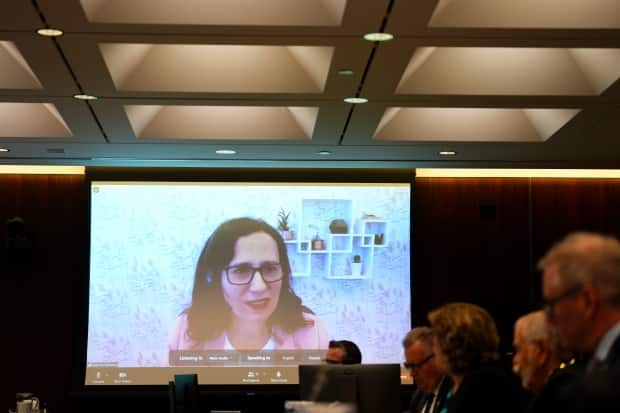MPs denounce Google for blocking news sites as executives testify before committee

Executives from Google Canada were in the Commons committee hot seat Friday after the company decided last month to block some Canadian users from viewing news content on its site in response to the government's proposed Online News Act.
Sabrina Geremia, the head of Google Canada, told MPs on the House heritage committee that the decision was simply a "test" and the company is exploring ways to adjust to the provisions in Bill C-18, currently working its way through Parliament.
"We can't assume that we're going to be able to link in the same way that we have in the past," she said. "Due to this uncertainty, tests were conducted. These are tests. They're not product decisions."
That didn't seem to satisfy MPs, who peppered Geremia with tough questions throughout the committee hearing.
WATCH | MP tees off on Google executive
Conservative MP Kevin Waugh asked why the company didn't notify Canadians it would be blocking news links before it ran the tests.
"You never told people you're blocking them out. You just arbitrarily did it," he said.
Geremia said it's normal practice to run product tests without notifying the public. Waugh said he didn't think that was fair to Canadians.
"I think you've over-exceeded your boundaries," he said.
The Online News Act, known as Bill C-18, would require companies like Google and Meta, which owns Facebook, to negotiate deals to compensate Canadian media companies for republishing their content on their platforms.
Last month, Google said it was temporarily limiting access to news content for less than four per cent of its Canadian users as it assessed possible responses to the bill. It said the tests would run for five weeks. CBC confirmed Friday that the blocking would end next week.
Geremia was meant to appear before the committee on Monday, but technical issues delayed the meeting.

A number of MPs expressed their frustration during the committee, saying they felt Geremia was attempting to dodge their questions.
"I think you're being evasive. You owe it to the Canadian people to answer these questions," Liberal MP Chris Bittle said at one point.
Waugh echoed the sentiment, saying he was "disappointed" in the testimony being presented.
"You continue to deflect a lot of the questions and that's not what Canadians are looking for," he said.
Liberal MP Hedy Fry, the committee chair, interjected on a number of occasions to insist that Geremia answer the questions she was being asked.
WATCH | 'You're under oath': MP pressures Google executive for answers
MPs summoned three other Google executives, including its CEO Sundar Pichai, to appear before the committee, but only Geremia and public policy manager Jason Kee were there to answer questions.
Liberal MP Anthony Anthony Housefather asked Geremia if she knew that the two American Google executives who, along with Pichai, were summoned to testify had been in Canada to lobby for changes to C-18 in recent months. She said she did.
"So they're willing to lobby against the bill privately but not willing to come to speak publicly," Housefather said.
Google representatives did bring their concerns about C-18 to the committee in the fall. Geremia and Kee echoed some of those concerns again Friday.
Kee said that the bill would incentivize "clickbait" journalism and favour larger news companies over smaller, local outlets.
"We're actually looking to incentivize … long-form, investigative journalism that is thoughtful versus low-quality journalism," Kee told the committee.
Conservative MP Marilyn Gladu raised a similar concern, saying the bill could make misinformation and clickbait more prominent online.
But NDP MP Lindsay Mathyssen challenged Kee on that point.
"You're suggesting that Google is the source on what is low-quality journalism?" she asked.
Conservative MP Martin Shields said he agreed that the bill missed an opportunity to benefit more local newspapers, but still said he thought Google's decision to block users was a "mistake."
"You can call it a test, you can call it a number of different things. But that's not how we perceive it and that's not how consumers will perceive it," Shields said. "It's tactical negotiations."
Google has said it would rather pay Canadian media outlets through a monetary fund than be regulated by the government.
But News Media Canada, which represents hundreds of digital and print outlets, said Google's recent move proves the need for more regulation.
"This heavy-handed unilateral behaviour underscores that there is a significant power imbalance between publishers and platforms that needs to be addressed," CEO Paul Deegan said in a statement.
The bill is currently awaiting its second reading in the Senate.


